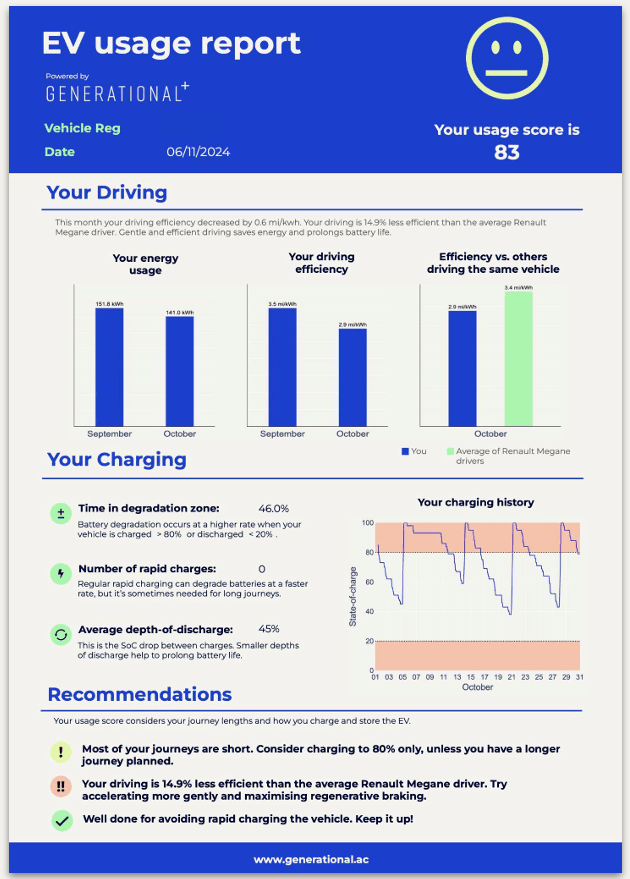We are delighted to now be offering a Battery SOH certificate for every EV sold from our forecourt. Drive Green were the very first UK EV company to start using a battery test system to certify battery health on all our electric vehicles.

How long an EV battery is likely to last remains the most common concern of potential EV owners. There is a large amount of misinformation out there, and equally there is a lack of information and transparency coming from EV manufacturers, who are still keeping their longer-term EV battery health data closely guarded.
As a result we, here at Drive Green, are conducting our own fully transparent battery health study, so consumers can have access to important information, and hopefully to allay their fears over the life span of an EV battery.
“Average degradation is only 1.8% pa”
Whilst the average battery degradation in 2024 is only 1.84% – which is considerably lower than most people’s expectation – this is actually 0.3% higher than the results from 2023.
Whilst more study needs to be done, it has been hypothesized that the slight increase in degradation seen this year could be the result of more EVs capable of super fast rapid charging being in the pool of tested cars; more EVs potentially being owned by people who cannot charge at home, meaning they are being rapid charged publicly more; and not least more EVs being sold to consumers without the adequate advice as to how to look after their EV’s battery.
As the gap between the best and the worst performing batteries increases, it underlines the importance of following our advice and not excessively rapid charging your EV (especially at the superfast charging rates), not just top-up charging, and not storing your EV fully charged.
Drive Green is the first company in the UK to battery test almost all of our EVs, and that has meant, over the last 2 years, we have accumulated a significant amount of battery health data from the hundreds of EVs we have sold.
This data has been analysed by our more technically skilled friends at ‘Generational’ to produce what we hope will be some interesting and meaningful results.
Whilst the sample size is meaningful we would rather this covered thousands rather than hundreds of battery tests, so the study will remain ongoing and will be further refined as we add more and more tests to it.
Key Results:
This last result is really interesting as it suggests other less visible factors in how the vehicle was used play the most important role. Ultimately this means charging is the biggest factor with faster or rapid charging being a key factor and regular small top up charging and number of charging cycles, and the kW charging rate, being equally important.
“Avoid small top up charges and rapid charging where possible”
This supports the advice we have always given to avoid small top up charges in particular, and to rapid charge only when necessary, whilst avoiding super fast charger, as the route to maintain the health of your battery. Charging between 20% and 80% is also another good strategy to help maintain your battery (on many EVs you can set the car to only charge to 80%).
There are a number of key factors affecting battery health in the following order of importance:
3rd – Mileage
2nd – Age
1st – Charging
Manufacturer Results
When it came to deciding whether to break the results down by manufacturer to give a kind of league table of performers, I found myself in a bit of a dilemma. The results are really valuable and very interesting, however the playing field of our study is not level, with the sample size not being equal for each brand.
So whilst I think the results overall with all EVs are very valid and really useful, I worry that putting one brands results against another might be unfair without a bigger and more evenly spread sample size.
Also we haven’t tested or included every brand as the sample size for some of the less popular brands at Drive Green were too small.
That being said, the results are what the results are, and we will be continuing this study on an ongoing basis adding results to make the study more accurate, and perhaps it is still right to report the results as we have them so far.
“Watch this space for updates to the study and the manufacturer rankings we are so keen to reveal”
However on reflection I think it is still right to continue the study further before we commit to ranking each manufacturers battery, but please do watch this space as we are very keen to provide this information, I just want to make sure it is right and fair first before we do.
For now though I would like to give some figures on what is the difference between the best and the worst performing batteries and what this means over time to put manufacturer differences into context:
| Brand | Predicted health after 3 years | Predicted health after 5 years | Predicted health after 10 years |
| Best | 95.7 | 92.8 | 85.6 |
| Worst | 92.1 | 86.9 | 73.8 |
This is future forecasting with some models when you look at 10 years in particular (although base on trends we see over time with our older EV’s), however it is interesting to see how arguably small the difference gap is between the best performing brand an the worst (based on current sample sizes).
“only 3.6% difference in average battery health between the best and the worst performing brands after 3 years, and 5.9% at 5 years, and 11.8% after 10 years”
Ongoing Study
We will be continuing to test the batteries of the used EV’s we sell for the benefits of our customers, as well as to add to this ongoing study.
Hopefully over time we can produce results regarding manufacturer difference in particular that we can standby and are happy to reveal to the winder marketplace. The patterns are already there we just need to be sure to make sure this data and its results are represented fairly.
“Please send us any battery health data you have on your EV”
Hopefully any EV owners reading this can also help in the study. If you have any data on the battery health of your EV, please do let us know so we can add it to our results, to make the study more and more meaningful and accurate. The more data – the more accurate the results.
We want to be providing EV consumers with as much information as possible to help them make the right choices and this ongoing study is going to be important part of this. Hopefully the results we produce will help encourage manufacturers to be more transparent and release their data as well. As said before the more data the more accurate the results will be, however we are proud to be conducting this study ourselves for now, to hopefully provide some more accurate info to consumers and to hopefully dispel some myths and confirm some theories around long term EV battery health.

If you would like to assist us in our study, please email us with the following information.

Completely Green Limited is authorised and regulated by the Financial Conduct Authority. Firm Reference number – 790525. We are a broker and not a lender. If you are not happy with the service you have received, you have the right to refer your complaint to the Financial Ombudsman Service.
Please note: Whilst every effort has been made to ensure the accuracy of the used vehicle information and images on this website, some errors may occur. It is important that you do not rely solely on this information, prices or images, and check with us any items that may affect your decision to purchase a vehicle. For an example monthly price, please use the finance calculator on each listing to retrieve a quotation. Representative Hire Purchase Example: Total Deposit: £2000 and Agreement Duration: 48 Months. Representative Personal Contract Purchase Example: Total Deposit: £2000 and Agreement Duration: 48 Months and 8000 miles pa. Representative Personal Contract Hire Example: Total Deposit: 12 months initial rental and 5000 miles pa, and Agreement Duration: 48 Months and Admin Fee: £299. Risk based variable lending rates apply with rates starting from 6.9% APR.